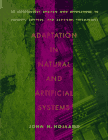| Sit at the foot of a native elder and listen as great wisdom
of days long past is passed down. The four agreements are these: Be impeccable
with your word. Don't take anything personally. Don't make assumptions.
Always do your best. |
 |
"Emergence" is the notion that the whole is more than the sum of its
parts. John Holland, the "father of genetic algorithms," says this seemingly
simple notion will be at the heart of the development of machines that
can think for themselves. |
 |
|
|
What really goes on inside the world of software development? How do
straightforward projects with
well-defined goals mutate into large-scale disasters? How do
personalities, ambitions, work environments, time and cost limitations
impact the creation of software? |
|
Dyson argues that new technologies can have as much of an effect
on the social and political realms as new ideologies do. In particular,
he cites three burgeoning technologies--solar energy, genetic engineering,
and the Internet--for their potential to affect a more equitable worldwide
distribution of wealth and power in the coming century. |
| From Sante Fe Institute founder Stuart Kauffman, whose investigations
concern nothing less than the nature of life. "It may be," he said in a
Scientific American interview , "that I have stumbled upon the proper definition
of life itself." |
 |
Organic chemist and accomplished polymath Joel de Rosnay, shows how
the sciences of complexity--the study of self-organization and the evolution
of complex systems--coupled with the power of modern computing, have ripened
into tool powerful enough to help us understand the systems of which we
are a part. Nature progresses when structures and functions combine into
higher-order assemblies: cells into organisms, organisms into populations,
populations into ecosystems. This progression is giving rise to what de
Rosnay calls the cybion, a planetary macro-organism consisting of all people
and machines, organisms, networks, and nations. |

|
 |
From a rigorous biological perspective, the ideas of complexity and
emergence get their due....emergence happens when a system of simple and
numerous parts does something you couldn't have predicted from a description
of the parts...well chosen examples of emergence in complex systems. |

|
John Holland's Adaptation in Natural and Artificial Systems is one
of the classics in the field of complex adaptive systems. Read this
book, and even if you don't read it, buy it and display it proudly. Scientists,
engineers, and coffee tables the world over should be interested in the
seminal book that first gathered and developed the critical mass of ideas
from mathematics, computational science, and systems theory necessary to
launch and fuel the ongoing revolution in complex innovating systems. |
| How We Became PostHuman - The title of this scholarly yet remarkably
accessible slice of contemporary cultural history has a whiff of
paradox about it: what can it mean, exactly, to say that we humans have
become something other than human? The answer, Katherine Hayles explains,
lies not in ourselves but in our tools. Ever since the invention
of electronic computers five decades ago, these powerful new machines have
inspired a shift in how we define ourselves both as individuals and
as a species. |
 |
George Gilder's Telecosm predicts a revolutionary new era of
unlimited bandwidth: it describes how the "age of the microchip"--dubbed
the "microcosm"--is ending and leaving in its wake a new era--the "telecosm,"
or "the
world enabled and defined by new communications technology."
A must read for Network Age devotees. |
 |
|
|
Out of Control is an accessible and entertaining explanation of why
the coming years will probably be the Age of Biology -- particularly evolution
and ethology -- and what this will mean to most every aspect of our society.
Kelly is an enthusiastic and well-informed guide who explains the promises
and implications of this rapidly evolving revolution very well. This
one was suggested by a developer in Seattle who had heard me speak -- thanks
Jeremy. |
|
We hear constantly about our current "information revolution." Twenty-four-hour
news channels and dizzying Internet technologies bombard us with facts
and pictures from around the globe. But what kind of a
"revolution" is this? How has information really changed from
what it was ten years or ten centuries ago? Albert Borgmann offers
some riveting answers to these questions in Holding On to Reality. |
|
Even as molecular biologists attempt to reproduce life in vitro, another group
of scientists is creating life--or something very close to it--in silico,
using computers to produce "organisms" that can move, see, feed, reproduce,
and die. This is nothing less than the existence of new varieties of life.
Some of these species can move and eat, see, reproduce, and die. Some behave
like birds or ants. One such life form may turn out to be our best weapon in
the war against AIDS.
|
|
What is the nature of life, and how are the shapes and instincts of living
organisms determined? Sheldrake's hypothesis, "Formative Causation", proposes
that form and function of all living things are passed to succeeding
generations by "morphogenetic fields" that extend through space and time.
The implications of this theory are staggering, from predicting the course of
hurricanes to explaining deja vu. Sheldrake's thinking seems radical because
he does not subscribe to orthodox scientific assumptions that the universe
operates like a machine; instead, he sees it as much like a living organism.
|
|
| |
|
|
|
| |
|
|
|
| |
|
|
|
|
|
|
|